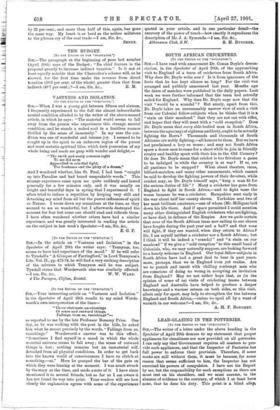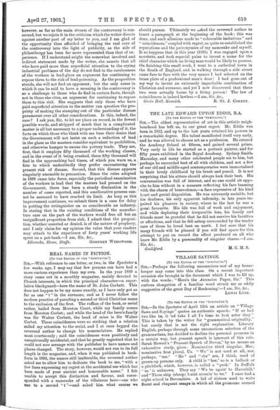LEAD-GLAZING IN THE POTTERIES.
[To THE EDITOR OF THE "SPECTATOR."] Sui,—The writer of a letter under the above heading in the Spectator of April 20th demurs to my statement that proper appliances for cleanliness are now provided on all potworks. I can only say that Government requires all masters to pro- vide such appliances, and that the Inspector of Factories has fall power to enforce their provision. Therefore, if some works are still without them, it must be because, for some reason that seems sufficient to him, the Inspector has not exercised his powers of compulsion. I have not his Report by me, but the responsibility for such exceptions as there are must rest on his shoulders, and we must assume, in the absence of evidence to the contrary, of which I at least have none, that he does his duty. This point is a blind alley. however, as far as the main stream of the controversy is con- cerned, but we rejoin it in the criticism which the writer directs against another part of my letter to you, and I am glad of the opportunity thus afforded of bringing the real core of the controversy into the light of publicity, as the side of philanthropy has been far more representdd than that of ex- perience. If I understand aright the somewhat involved and indirect statement made by the writer, she asserts that all who have paid more than superficial attention to the crying industrial problems of the day do not find in the carelessness of the workers in lead-glaze an argument for continuing to expose them to the risk of lead-poisoning. As the proposition stands, she will not find an opponent, but the only sense in which it can be said to have a meaning in the controversy is as a challenge to those who do find in certain facts, though not in those she cites, an argument for continuing to expose them to this risk. She suggests that only those who have paid superficial attention to the matter can question the pro- priety of making the stamping out of the particular disease paramount over all other considerations. Is this, indeed, the case ? I ask you, Sir, to let me place on record, in the fewest possible words, and stripped of much that in a complicated matter is all but necessary to a proper understanding of it, the facts on which those who think with me base their desire that the Government will not insist on such a reduction of lead in the glaze as the masters consider equivalent to prohibition, and otherwise hamper to excess the pottery trade. They are, first, that it employs fifty thousand of the working classes, and in the event of it being crushed, these fifty thousand will find in the approaching bad times, of which you warn us, a fate to which undoubtedly they prefer encountering the present risk of disease. Second, that this disease appears singularly amenable to precaution. Since the rules adopted in 1898 came into force, especially the periodical examination of the workers in lead that the masters had pressed on the Government, there has been a steady diminution in the number of cases reported, and this ameliorative process can- I not be assumed to have reached its limit. As long as this improvement continues, we submit there is a case for delay I in putting the extinguisher on so considerable an industry. In stating that in the existing conditions of the manufac- ture care on the part of the workers would free all but an insignificant proportion from risk, I admit that the proposi- tion, whether asserted or denied, is of the nature of prophecy, and I only claim for my opinion the value that your readers may attach to the experience of forty years' working life spent on a pot-bank.—I am, Sir, &c.,























































 Previous page
Previous page